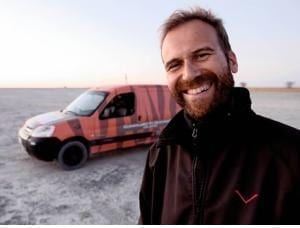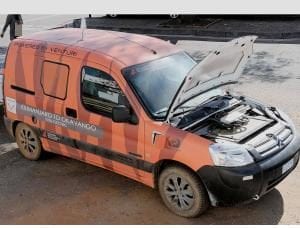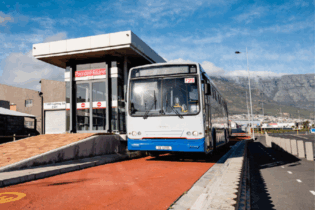Frenchman and eco-explorer Xavier Chevrin has driven an electric-powered Citroën Berlingo from Nairobi (Kenya) to Johannesburg, covering approximately 5 500 km over a five-week period, and recharging around 40 times at various stopovers along the way.
The challenge, undertaken by electric-vehicle converter Venturi, is in the interests of sustainable development. Dubbed Mission Africa and backed by the Prince Albert II of Monaco Foundation, the challenge is an official part of the International Year of Sustainable Energy for All – a United Nations initiative.
Eco-explorer Xavier Chevrin The journey went through Kenya, Tanzania, Zambia, Zimbabwe, Botswana and South Africa and aimed to make communities more aware of the importance of clean energy. The electrical energy sourced to charge the car was also clean in that most of Africa’s electricity generation is hydro- and not fossil-fuel based. Powering the Berlingo are three nickel sodium chloride batteries – which interestingly are manufactured by Zebra, a South African-based company. Total output of the batteries is listed as 70.5kWh (3 x 23.5kWh), and the batteries can last 1200 cycles of charging – which is estimated at five years of normal usage. The front wheels are turned by a three-phase motor with a maximum torque output of 180Nm, top speed is quoted as 110km/h, and maximum range as 500km (at much lower speeds). At the press conference in Johannesburg earlier this week Chevrin said that when he cruised at 40km/h his range would be in the region of 450km, while at 70-80km/h that range dropped to 300km.
Charging the batteries on the journey proved challenging (65 percent of Africans in the region covered have no access to electricity), with each battery requiring 10 amps of charge overnight from at least a two-phase power source.
Chevrin would generally charge at petrol stations or little shops. He would ask for the location’s power box and use his equipment to match the power source to the batteries. Chevrin says the cost of the electricity used for the journey was around 15 times cheaper than if he’d used regular fuel. Most of the time the locals didn’t charge him for the power though, and a few t-shirts was generally sufficient payment. Of the total distance travelled just 600km was dirt based – which was fortunate as outside of the electric drivetrain the Berlingo is stock standard. There have been no modifications to ride height, or suspension, or even wheels for that matter. And the journey, with those cool Monaco-registered plates, was completed without a single hitch. The electric-powered Berlingo is on sale in France for 25 000 Euros (R262 500), but there are no plans to bring it to South Africa. Venturi has also been involved with breaking the electric-car world-speed record at the Bonneville Salt Flats (515km/h), it has undertaken a similar journey from Shanghai to Paris, and it will be part of an electric journey through Antarctica next year. “This journey puts us in contact with different populations who will discover an electric vehicle for the very first time, and all the magic that surrounds this silent means of propulsion. It’s an adventure which also embodies our desire to demonstrate that the electric vehicle is an alternative to the combustion engine all over the world,” said Venturi’s President, Gildo Pallanca Pastor.







